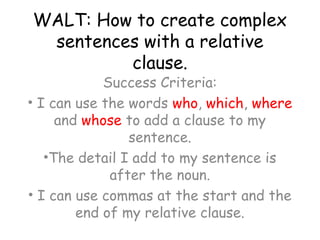
Relative clauses
- 1. WALT: How to create complex sentences with a relative clause. Success Criteria: • I can use the words who, which, where and whose to add a clause to my sentence. •The detail I add to my sentence is after the noun. • I can use commas at the start and the end of my relative clause.
- 2. What is a relative clause? A relative clause is a type of subordinate clause. A relative clause usually adds more detail about the noun in the main clause. Relative clauses turn our simple sentences into complex sentences and up level our writing! For example, this simple sentence: The boy walked to school. Can become a complex sentence by adding the clause: The boy, who was feeling upset, walked to school. The main clause could stand alone as a simple sentence, but the relative or subordinate clause
- 3. You can add extra information to your sentences, by adding extra information in a relative clause. The man was waiting in a queue. The man, who was a sailor, was waiting in the queue. What extra information was added to the sentences? Where was it added? What punctuation was added and where? The snarling beast roared with all his might. The snarling beast, whose breath smelled like rotting eggs, roared with all his might.
- 4. Demetrius was a fisherman. He was 18 years old. Demetrius was desperately sad. His parents had disappeared. His home was the island of Kos. It was peaceful and beautiful. His mother had been taken by Poseidon, God of the sea. Her eyes were as blue as the ocean. Which words can you use to join these 2 simple sentences into 1 complex sentence? who whose which where
- 5. Now add more detail to these simple sentences using the joining words in the stars. Write your new sentences in your topic books. 1. The terrifying minotaur charged at Theseus. 2. The creatures flew and attacked him. 3. The powerful ship sailed carefully through the huge, jagged rocks. 4. Jason skillfully used his sword to slay the harpies. 5. Hercules managed to slay the lion. 6. The hydra had nine heads. 7. The Greek Gods liked to interfere with the lives of the poor mortals. 8. Poseidon sent a powerful, terrifying sea creature called the Kraken. 9. Zeus used a thunderbolt as his weapon. 10.Ariadne handed Theseus a ball of string. who whose which where Remember to add your detail after the subject. Don’t forget punctuation!
- 6. Give more information about someone or something using words like: who whose which where • Example: • The girl walked into the classroom. • As the girl, with flaming red hair and freckles on her nose, walked into the classroom, all heads turned to stare at her. • The girl, who was feeling very nervous by now, walked into the classroom, although she really felt like bolting out of the door. • Since this was her first day at her new school, the girl thrust back her shoulders confidently and walked into the classroom, which by now was packed with children. • The boy sat in the corner.
- 7. Give more information about someone or something using words like: who whose which where • Example: • The girl walked into the classroom. • As the girl, with flaming red hair and freckles on her nose, walked into the classroom, all heads turned to stare at her. • The girl, who was feeling very nervous by now, walked into the classroom, although she really felt like bolting out of the door. • Since this was her first day at her new school, the girl thrust back her shoulders confidently and walked into the classroom, which by now was packed with children. • The boy sat in the corner.